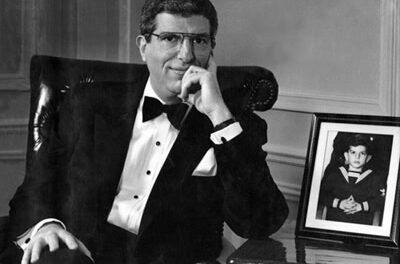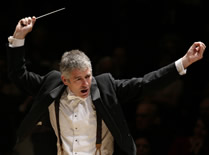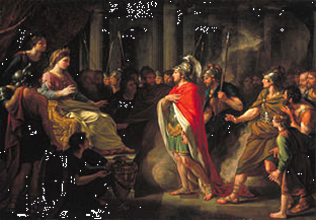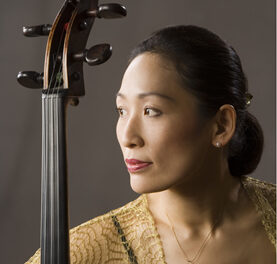On Sunday afternoon, the Raleigh Civic Symphony gave what can only be described as a gala program in Meymandi Concert Hall, an atypical venue for this town-and-gown orchestra (whose members encompass students and community musicians); the ensemble’s appearance in the customary home of the NC Symphony was occasioned by the ongoing reconstruction of NCSU’s Talley Student Union, wherein is located Stewart Theatre, the RCS’ nominal home. (The center is not expected to reopen until the fall of 2015.)
Why call an all-Beethoven concert a gala? Well, that alone – the program, that is – is more than sufficient justification, for the composer remains a revolutionary even after all these years. The menu consisted of the Triple Concerto, the Egmont Overture, a song that fit the mix on multiple levels, and the Choral Fantasy. The order was atypical, since concerti – and especially concerti for multiple instruments – tend to come last in the cookie-cutter programming to which we are now accustomed, but in this instance the grand finale was a grand finale indeed, for it’s the closest Beethoven came to the end of the Ninth Symphony aside from, well, the Ninth.
The formal occasion was the celebration of 90 years of Music @ NC State. Dr. Robert Petters was the host, and he noted that there are twice as many music students at NCSU now (2,600) as there were students at the whole of the college of agriculture and engineering, back in 1923. (Imagine that!)
The Concerto was radiantly played by about as fine a line-up of soloists as one could reasonably be expected to muster hereabouts: violinist Brian Reagin, concertmaster of the NC Symphony, cellist Jonathan Kramer, a former NCS cellist who escaped years ago to become Artist in Residence at State and wound up making a distinguished academic career there (including a stint as conductor of the RCS), and pianist Olga Kleiankina, latest in a succession of outstanding keyboard artists at the University.
The orchestra was under the capable leadership of Nathan Leaf, the Director of Choral Activities; he did superbly well on the podium, helping ensure unified and finely-balanced playing that admirably supported the work of the solo artists. This is one of Beethoven’s most congenial works and one of his most inspired – is there anything more lovely in all of music than the opening of the slow second movement, here radiantly played by Kramer? He and Reagin were often inspired in their work together, and the truly remarkable pianist served as the glue that bound up the piano trio – for that’s what it is, of course – in its recurring conversations with the accompanying forces. The substantial audience seemed to love it.
After intermission, and following a rock-solid performance of the well-known Egmont Overture, Petters and bassist Jessie Birckhead, speaking on behalf of the orchestra, paid stirring tribute to Randolph Foy, the artist-teacher who for 15 years built, enriched, and guided this orchestra and the chamber ensemble he created along the way. Illness obliged the Maestro to step down last season, but he will long be remembered for the improvements he wrought and for the outstanding ensemble he has left behind for NC State and its community.* Foy was present for the moving remarks, at the conclusion of which he was given a book of keepsake memorials from students, colleagues, and many of the artists with whom he has worked. A prolonged standing ovation ensued, the applause lasting many minutes. (For the biographical sketch that was included in the program, click here.)
The program continued with soprano Kathryn Mueller, on loan from ECU, and pianist Tom Koch, who offered one of Beethoven’s finest songs, “Seufzer eines Ungeliebten und Gegenliebe,” WoO 118, the big tune from which serves as one of the main themes in the concert’s concluding work and part of the text of which – so wonderfully appropriate for an occasion like this – is quoted as this review’s subtitle. This intimate rendering was in complete keeping, musically and artistically, with the rest of the afternoon. And it led promptly into the Choral Fantasy, which begins like a piano concerto, with Koch here taking the solo role, and ends with some of the happiest, most celebratory and optimistic music ever penned. The choral parts were sung by members of NCSU’s choirs, combined for this concert: the State Chorale, Vox Accalia, and the Singing Statesmen. One might quibble over a rocky entry by the men at one point, but the forces recovered at the start of the next phrase, and the piece ended gloriously, to yet another standing ovation. Leaf’s leadership here and in the Overture, too, remained secure, confident, and informed.
It was good. It was, for old-timers, almost unbelievably good. For that, in large measure, we have Randolph Foy to thank. So here goes: Thank you Dr. Foy. Thank you, Godspeed, and may the wind always be at your back.
*Believe me. The Lambert family came here in 1952, when the Music Department was barely 30, and the family matriarch played in the State orchestra under former bandmaster Christian Kutchinski. Aside from starting together and ending together – some of the time – there is no similarity between back then and now – none whatsoever!
Note: Spring concerts by the RCS and the Raleigh Civic Chamber Orchestra will be conducted by Robert Petters. Stay tuned for announcements of the specific dates and programs.













